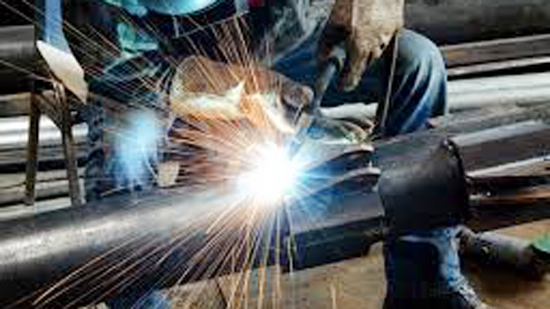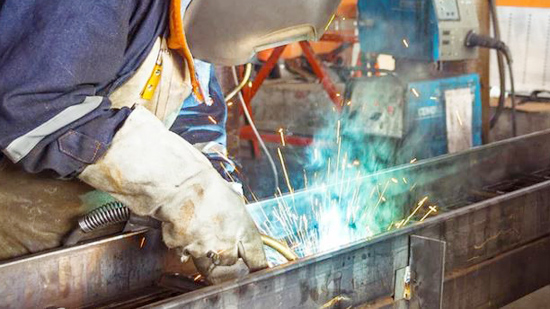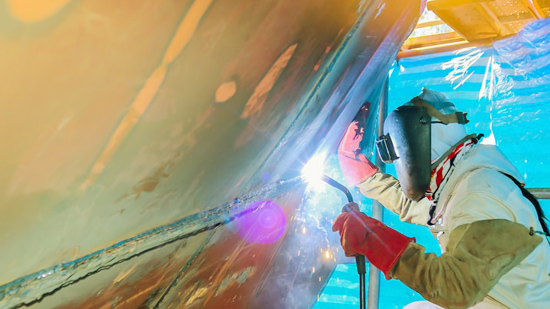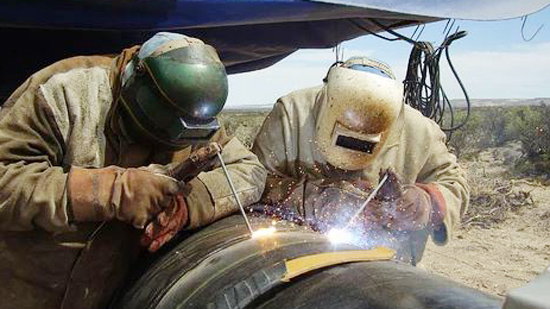If you’re looking to kickstart your career in welding, you’ve come to the right place. We’ll guide you step-by-step on how to get a welding job and make a lasting impression on potential employers. Welding is a skilled trade that offers a variety of job opportunities across industries like manufacturing, construction, and automotive. By mastering this craft, you can become an in-demand professional in a field known for its stability and rewarding pay.
We’ll cover the essential steps to help you secure a welding job that suits your skills and goals. From obtaining the necessary certifications to building a standout resume and nailing the interview, we’ve got you covered. We’ll also provide tips on networking, staying informed about industry trends, and growing your career as a welder.

Photo by allstatecareer.edu
So, if you’re ready to light up the torch and make sparks fly with your welding skills, let’s get started on your journey to landing the perfect welding job.
Demand for Welders in the Job Market
The demand for welders in the job market is high, making it an excellent career choice for those interested in skilled trades. Welding is a crucial process in industries such as manufacturing, construction, and automotive, where it is used to join metal parts together. As infrastructure projects continue to grow and industries expand, the need for skilled welders becomes more apparent. Welders are responsible for creating and repairing structures, equipment, and machinery, making them an essential part of the workforce.
With a shortage of skilled welders in many regions, employers are actively seeking qualified individuals to fill these positions. This demand offers excellent job prospects and opportunities for those willing to invest in their welding skills.
The demand for welders is expected to grow steadily in the coming years. According to the Bureau of Labor Statistics, employment of welders, cutters, solderers, and brazers is projected to increase by 3 percent from 2020 to 2030. This growth can be attributed to the need for new infrastructure, maintenance of existing structures, and the retirement of experienced welders. With the right skills and qualifications, you can position yourself as a valuable asset in the job market and secure a welding job that aligns with your goals.
Types of Welding Jobs
Welding offers a wide range of job opportunities across various industries. As a welder, you can specialize in different types of welding processes, each requiring specific skills and knowledge. Here are some common types of welding jobs you can consider:
MIG Welding: MIG (Metal Inert Gas) welding is a popular welding process that uses a wire electrode to join metal pieces. This type of welding is commonly used in manufacturing industries, automotive repair, and construction.
TIG Welding: TIG (Tungsten Inert Gas) welding is a precise and versatile welding process that produces high-quality welds. It is commonly used in industries such as aerospace, automotive, and fabrication.
Stick Welding: Stick welding, also known as Shielded Metal Arc Welding (SMAW), is a welding process that uses a consumable electrode coated in flux to join metals. It is widely used in construction, maintenance, and repair work.
Pipe Welding: Pipe welding involves joining metal pipes using various welding techniques. This type of welding is common in the oil and gas industry, plumbing, and construction of pipelines.
Underwater Welding: Underwater welding is a specialized field that involves welding in underwater environments. It requires additional training and certifications due to the unique challenges posed by working underwater.
These are just a few examples of the types of welding jobs available. Depending on your interests and skills, you can choose a specialization that aligns with your career goals.
Essential Skills and Qualifications for Welding Jobs
To succeed in the welding industry, there are essential skills and qualifications you need to acquire. These will not only make you a competent welder but also increase your chances of getting hired. Here are some key skills and qualifications to consider:
Technical Skills
Welding requires a strong understanding of welding techniques, equipment operation, and safety procedures. You should be proficient in reading blueprints, interpreting welding symbols, and selecting the appropriate welding methods and materials for different projects.
Certifications
Obtaining industry-recognized certifications can significantly enhance your employability. Some common certifications for welders include Certified Welding Inspector (CWI), Certified Welder (CW), and Certified Welding Educator (CWE). These certifications validate your skills and knowledge in specific welding processes and can open doors to better job opportunities.
Safety Awareness
Welding involves working with high temperatures, sparks, and hazardous materials. Safety should always be a top priority. Understanding and following safety protocols, wearing appropriate personal protective equipment (PPE), and being aware of potential hazards are crucial for both your well-being and the success of your welding career.
Problem-Solving Abilities
Welders often encounter challenges during projects, such as welding in tight spaces or dealing with metal distortion. The ability to think critically and find solutions to problems is highly valued in the welding industry. Being adaptable and resourceful will help you overcome obstacles and deliver quality welds.
Physical Stamina
Welding can be physically demanding, requiring prolonged periods of standing, bending, and lifting heavy materials. Having good physical stamina and strength is essential to perform welding tasks efficiently and minimize the risk of injuries.
By developing these skills and obtaining the necessary qualifications, you’ll be well-equipped to pursue a successful welding career.
How to Prepare for a Welding Job
Preparing for a welding job involves various steps, from honing your skills to gathering the necessary documents. Here’s a breakdown of what you need to do:
Gain Hands-On Experience
Practice your welding skills regularly to improve your technique and confidence. Consider enrolling in a welding training program or apprenticeship to receive structured training and guidance from experienced professionals. The more experience you have, the more attractive you’ll be to potential employers.
Obtain Certifications
Research and identify the certifications that align with your career goals. Depending on the type of welding you’re interested in, there are different certifications available. Study the certification requirements, prepare for the exams, and schedule your tests accordingly. Being certified demonstrates your commitment to excellence and can increase your chances of landing a job.
Build a Portfolio
Create a portfolio of your welding projects to showcase your skills and craftsmanship. Include photographs or samples of your work, along with a brief description of each project. A portfolio allows potential employers to see your capabilities and the quality of your welds.
Update Your Resume
Craft a professional resume that highlights your welding skills, certifications, and relevant work experience. Tailor your resume to each job application, emphasizing the skills and qualifications that align with the specific job requirements. A well-written resume can grab the attention of employers and make you stand out from other applicants.
Prepare for Interviews
Research common interview questions for welding jobs and practice your responses. Be prepared to discuss your welding experience, problem-solving abilities, and safety practices. Additionally, familiarize yourself with the company you’re applying to and the industry trends to demonstrate your interest and knowledge.
By following these steps, you’ll be well-prepared and confident when applying for welding jobs.
Finding Welding Job Opportunities
Now that you’ve prepared yourself for a welding job, it’s time to find suitable job opportunities. Here are some effective ways to search for welding jobs:
Online Job Boards
Check popular job boards and employment websites for welding job listings. Websites like Indeed, LinkedIn, and Glassdoor often have a dedicated section for skilled trades, including welding. Use relevant keywords like “welder,” “welding job,” or “welding career” when searching for job openings.
Networking
Reach out to your professional network, including friends, family, and former colleagues, and let them know you’re looking for welding jobs. Attend industry events, trade shows, and job fairs to connect with potential employers and fellow professionals. Building relationships and networking can often lead to hidden job opportunities.
Company Websites
Explore the websites of manufacturing companies, construction firms, and other industries that require welding services. Many companies list job openings on their websites, allowing you to apply directly.
Trade Associations
Join welding trade associations and organizations in your area. These associations often have job boards or resources specifically for their members. Additionally, they provide opportunities for networking, professional development, and staying updated on industry trends.
Apprenticeships and Internships
Consider applying for apprenticeship or internship programs that provide hands-on training and real-world experience. These programs not only enhance your skills but also allow you to make valuable industry connections.
Customize your job applications and cover letters for each opportunity. Highlight your relevant skills and experiences to demonstrate your suitability for the position.
Crafting an Effective Welding Resume
A well-crafted resume is essential for grabbing the attention of potential employers and securing interviews. Here are some tips for creating an effective welding resume:
Start with a Strong Summary
Begin your resume with a compelling summary that highlights your welding experience, certifications, and key skills. This summary should grab the reader’s attention and make them want to learn more about you.
Include Relevant Skills
List your welding skills prominently on your resume. Mention specific welding processes you’re proficient in, such as MIG, TIG, or stick welding. Highlight any additional skills, such as blueprint reading, welding inspection, or metal fabrication.
Detail Your Work Experience
Provide a comprehensive list of your work experience, including the names of previous employers, job titles, and dates of employment. Describe your responsibilities and accomplishments in each role, focusing on welding-related tasks and projects. Use action verbs and quantify your achievements whenever possible.
Highlight Certifications and Education
Clearly state your welding certifications, including the issuing organization and the date of certification. Include any relevant education or training programs you’ve completed, such as welding courses or apprenticeships.
Include a Welding Portfolio
If you have a welding portfolio, mention it on your resume and provide a link or sample photos. This allows employers to see your work and assess your welding abilities.
Proofread and Format
Ensure your resume is free of grammatical errors and typos. Use a clean and professional format, with clear headings and bullet points for easy readability. Keep your resume concise and limit it to one or two pages.
Tailor your resume for each job application by emphasizing the skills, experiences, and qualifications that are most relevant to the specific position.
Nailing the Welding Job Interview
Once you’ve secured a job interview, it’s time to prepare and make a great impression. Here are some tips to help you nail the welding job interview:
Research the Company
Familiarize yourself with the company you’re interviewing with. Understand their products, services, and any recent projects they’ve worked on. This knowledge will demonstrate your interest and enthusiasm for the company.
Review Common Interview Questions
Practice responding to common interview questions for welding jobs. Be prepared to discuss your welding experience, safety practices, problem-solving skills, and how you handle challenging situations. Practice your responses to ensure clarity and confidence.
Bring Your Welding Portfolio
If you have a welding portfolio, bring it to the interview. This allows you to showcase your work and discuss specific projects in detail. Be prepared to explain your role in each project and the challenges you faced.
Dress Professionally
Dress appropriately for the interview, wearing clean and professional attire. Opt for clothing that allows you to move comfortably, as the interviewer may ask you to demonstrate your welding skills.
Demonstrate Your Knowledge and Skills
During the interview, emphasize your welding knowledge, certifications, and hands-on experience. Discuss specific welding processes you’re proficient in and any special projects you’ve worked on. Highlight your problem-solving abilities and commitment to safety.
Ask Relevant Questions
Prepare a list of questions to ask the interviewer. Inquire about the company’s welding processes, safety protocols, and future projects. Asking thoughtful questions shows your genuine interest in the position and allows you to gather valuable information.
Express Your Eagerness to Learn
The welding industry is constantly evolving, with new technologies and techniques emerging. Express your eagerness to learn and adapt to these changes. Employers value individuals who are open to continuous improvement and staying updated on industry trends.
Follow up with a thank-you note or email after the interview, expressing your gratitude for the opportunity to interview and reiterating your interest in the position.
Tips for Starting a Successful Welding Career
Starting a successful welding career goes beyond landing your first job. Here are some tips to help you thrive in your welding career:
Continuously Improve Your Skills
Never stop learning and honing your welding skills. Stay updated on industry trends, new welding techniques, and emerging technologies. Consider attending workshops, seminars, or advanced training programs to expand your knowledge base.
Network and Build Relationships
Networking is crucial in the welding industry. Attend welding conferences, trade shows, and industry events to connect with professionals and potential employers. Join online welding communities and forums to learn from experienced welders and stay connected with the latest industry news.
Seek Mentorship
Find experienced welders who can mentor and guide you in your career. They can provide valuable insights, share their experiences, and offer advice on navigating challenges in the welding industry.
Stay Safe
Safety should always be a top priority in welding. Follow proper safety protocols, wear appropriate personal protective equipment (PPE), and stay informed about potential hazards. Regularly review and update your knowledge of safety practices to minimize the risk of accidents or injuries.
Consider Specializations
As you gain experience, consider specializing in a specific area of welding that interests you. Becoming an expert in a particular welding process or industry niche can open doors to more challenging and rewarding opportunities.
Embrace Continuous Learning
The welding industry is dynamic, with new technologies and techniques constantly emerging. Embrace continuous learning and be open to acquiring new skills. This adaptability will keep you competitive and ensure long-term success in your welding career.
Conclusion
Securing a welding job requires a combination of skills, qualifications, and preparation. By obtaining the necessary certifications, building a standout resume, and nailing the interview, you can increase your chances of landing a welding job

I’m Darrell Julian, the founder, lead writer, and hands-on welding enthusiast behind ArcWeldingPro.com. With more than 15 years of real-world welding experience, I created this platform to share what I’ve learned in the field, in the shop, and in the heat of the arc.



